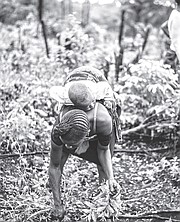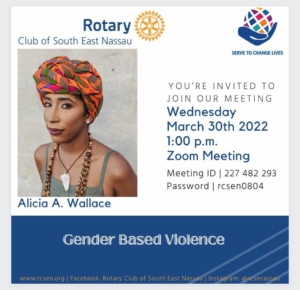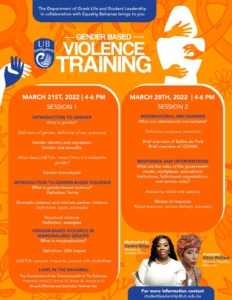It is nowhere near surprising to read news stories about increased reports of sexual violence. It has become a near-daily challenge to get through articles about court cases involving men who have raped or otherwise sexually assaulted children where their crimes are referred to as sex or, in some other way, named as though they are not criminal, abuses of power, and void of consent.
The language used by police and courts is used in newspapers, all but erasing the word “rape” from public conversation. This is, in part, how we have come to talk about children as though they are adults, and survivors as though they are perpetrators. This is rape culture. This is adultification of children (and black girls in particular), the hatred of women, the refusal to acknowledge human rights, and the determination of far too many people to ignore the crisis that is gender-based violence.
Violence of many kind has been normalised in The Bahamas. It has been a part of our everyday vernacular for a long time with words like “hit” being used to describe various acts that are not necessarily violent, and threats of violence are made loosely, in jest, and without reproach.
“Rape” is used to describe various activities that people consider unfair, but which, otherwise, do not compare to the vile, criminal act of sexual violence. Somehow, though, when it comes to rape, the language changes. There is less willingness to use the appropriate word — rape. Instead, terms like “unlawful sex” are used to refer to the criminal act of a man raping a child. There is no excuse for this. Police reports do it, then the news media does it. The courts do it, then the news media does it again. One says they are using the language of the other, for consistency, yet the law says that the offence is rape.
Rape is caused by rapists. Rape culture makes it easy for rapists to rape people. Rapists seek to dominate, so people in situations of vulnerability, largely due to their identities, are often targeted. These include women, children, and people with disabilities. Rape, as we have seen in the reported cases over the past few weeks, does not need many conditions in order to occur. Rape happens during the day, and it happens at night. It is perpetrated by rapists indoors and outdoors. Rape is perpetrated against strangers, family members, friends of family members, friends, co-workers, people under the care of the rapist, and people with many other relationships to the rapist. There is no single act or set of actions that anyone can take to prevent themselves from becoming the target of a rapist. Rapists rape.
It is not that nothing can be done to prevent rape, but that preventative action is not for potential targets to undertake. It is not up to individuals to protect themselves from rapists. It is for governments to enact and enforce laws, make clear the obligations of institutions, including schools and workplaces, connect institutions and stakeholders and facilitate ongoing communication and implementation of action plans, develop appropriate, effective interventions, provide support services for survivors, centre survivors and their healing in justice systems and practices, and provide programmes for perpetrators that rehabilitate and prevent recidivism.
Asked about the increase in reports of sexual violence, the police press liaison officer said there are “crimes of opportunity because we are not taking the time out to put necessary precautions in place”. Let us assume, for the purpose of usefulness and productivity, that the officer was referring to prevention that must be led by public institutions. What precautionary systems and measures should be in place?
Let’s start with the root of this issue. There is a dangerous gender ideology that stems from slavery, colonialism, capitalism, and patriarchy that has convinced people that women are subhuman, are to be dominated by men, and are objects. It has also convinced people that men are to perform masculinity in the most toxic ways which include violence, hostility, a very limited range of emotions, and both the willingness and ability to dominate anyone who is not a man performing in the same way, especially women and men who are not (perceived to be heterosexual.
The vast majority of sexual violence is perpetrated by men. This is not disconnected from toxic masculinity or the constraints of the gender ideology that put women and men in boxes while marginalizing all other people. One of the ways that some men seek to assert their masculinity — and distance from femininity which has been so devalued by heteronormative gender ideology that it is regarded as perverse — is perpetrating violence. When manhood is questioned, when masculinity is undermined, when authority is not theirs alone, see how many men thump their chests and proclaim, “I’s man!”
Listen to the threats they spew. Watch the way they engage women as opposed to men. Listen to the way women talk about their experiences with them. Differentiate between the platonic love and respect they have for each other and the vitriol and disdain they have for women they may even claim to love.
Where a relationship exists, perpetrators of violence convince themselves that it is ownership. Where a relationship does not exist, and a perpetrator wants there to be a relationship, he decides to punish. Where a relationship does not exist and the perpetrator has no interest, and ownership — by another man — is not established or immediately evident, the perpetrator assumes control.
Rape is about power and control. Relationships only determine how a perpetrator violates a person, unless he respects a man who has already claimed ownership. All of this is misogynistic. All of it is dehumanising. It is all linked to the idea that women are subhuman and subject to the whims of men. This dangerous idea is perpetuated in explicit and implicit ways, from fathers giving their daughters away at weddings to the normalization of sexual harassment in public spaces. None of this has anything to do with what women do or do not do, or efforts made or not made to protect ourselves from rapists. It is directly related to societal ideas and behaviours related that subjugate, devalue, and dehumanize women and girls.
The press liaison officer, unfortunately, went on to do what we have come to expect from the police. Victim blaming. “Females need to make sure that they are upfront and they are honest with their family members in letting them know where they are going, who they are going with, and not saying you going one place and you end up another and something goes wrong.”
While we may agree, in theory, that it can be helpful for us to let people know our plans, we need to be realistic about the benefits of the practice. If something goes wrong and people know where we are, then what? Something has already gone wrong. Sure, we may be found and receive assistance sooner, but the violation has already occurred. No sharing of plans would prevent a rapist from raping in a location that we disclose. The problem is the rapist. We can, of course, delve into the reasons people lie and withhold information, especially when there are differences in values and fear of judgment. For now, we need to be realistic about where prevention takes place.
Prevention is in schools. It is in the way we teach children about their bodies, about consent, and about paying attention to and responding to their instincts. It is in comprehensive sexuality education, and discussions on healthy relationships, warning signs of abuse and abusive partners, sex positivity, and bodily autonomy. It is in households. It is in the way we tell people to moderate their behaviour, the respect we show and demand be shown to our children, the communication channels and practices, and the modeling of safe, healthy relationships of various kinds.
Prevention is in street lighting. It is in safe, reliable, accessible public transportation, and having it as an option at night. It is in the clearing of bushes, pedestrian crossings and enforcement of traffic laws. It is in legal reform to criminalise rape, contributing to the widespread understanding that rape is rape, no relationship is a defence for rape, and women are human beings with human rights regardless of marital status. It is in legal systems and practices, from bail to assessing the actual effects of a sexual offenders registry to reporting mechanisms.
Prevention is in the way government officials regard women and girls, and the urgency with which they respond to issues, especially gender-based violence, that directly affect us and often lead to femicide.
The Minister of Social Services said: “The rush of the past in dealing with sensitive issues have failed and caused Bahamians to be sceptical and cynical about what they perceive is haste without complete dialogue with the people.”
This is a matter of urgency. Years and years of back and forth on a bill, turning it into a senseless debate when it is an issue of human rights, is not rushing. This issue is not sensitive to anyone but the people experiencing violence every day, and having little or no recourse. It is not sensitive to government actors, content to let bills like the marital rape bill and the gender-based violence bill languish, and who allow extended discourse about whether or not it matters that a woman is raped if the rapist is her husband. There is no sensitivity there, and there is certainly no sense.
The minister also said: “The position of the Church is fundamental and has been in each step taken in the growth and development of our country.”
The Church is fundamentalist. The religious leaders who are talking about this issue, delaying the bill with their misogynistic, violent nonsense are fundamentalist. They fundamentally believe that women are less than men. That women do not deserve rights. That men should get away with rape if they are married to the victim or survivor. That their god is pleased with violence. That their opinions are more important than the fact that rape is violence, women have human rights, and that those rights include freedom from violence.
This is what is delaying the passing of the marital rape bill. This is what is delaying the gender-based violence bill (rather than the significant work that needs to be done to make it useful, including actual engagement with human rights experts and NGOs with proven technical expertise on women’s human rights rather than the government’s — or the Attorney General’s Office’s — selection of yes-organisations).
“We have made progress, and we will soon complete our due diligence,” the Minister of Social Services said.
What progress? What due diligence? What is the meaning of “soon”?
It is interesting to see the specific ways that government institutions suggest we, women and girls, protect ourselves, juxtaposed with the vague, unsubstantiated nonsense they offer when pressed to do more than perpetuate rape culture by blaming us for the violence we experience.
If the government did its job, we would be able to go to ours without being raped on the way, or on the way back, or while there, or during a call to tell someone where we’re going, or when catching a ride, or or or or or.
At some point, the government, especially legislators and law enforcement, must accept that the blame is on rapists, and that they facilitate rapists far better than they protect us, the women and girls who live with the perpetual fear of rape, and/or the memory of it.
Published in The Tribune on April 5, 2023






